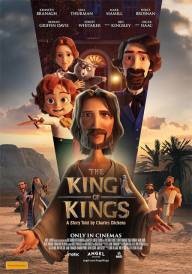Jean-Pierre Bacri C'est La Vie Interview
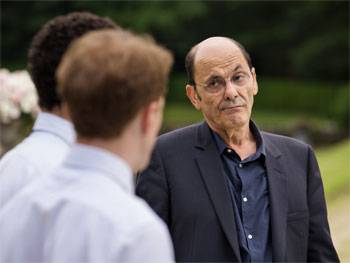
A Hectic Wedding Party Held In An 17th Century French Palace
Cast: Jean-Pierre Bacri, Jean-Paul Rouve, Gilles Lellouche
Directors: Olivier Nakache, Éric Toledano
Genre: Comedy
Rated: 117 minutes
Running Time: M
Synopsis: Max has been a caterer for 30 years.
He has organised hundreds of events, and is probably pretty close to throwing in the towel. Today there will be a magnifcent reception in a 17th century château: one more wedding, Pierre and Helena's.
As usual, Max has taken care of everything: recruited his wait staff, cooks, and dishwashers. He has recommended a photographer, reserved an orchestra, and arranged for the floral decorations: in short, all the ingredients to make the reception a success…
But in accordance with Murphy's Law, all his planning will be upset, and everything will go wrong, turning every moment of joy and emotion into a disaster and ending in chaos.
From the earliest preparations to the crack of dawn, we will follow this evening from behind the scenes, from the point of view of his staff, who can count only on the one thing they have in common: knowing how to throw a good party.
C'est La Vie
Release Date: August 8th, 2018
Interview with Eric Toledano and Olivier Nakache
Question: When did you frst come up with the idea of "Sens de la fête"?
Eric Toledano: This movie was first conceived in the glum context of the year 2015. Olivier and I may have been feeling a little sad, and felt the need to try for something a little more festive. The idea was to laugh, to have fun, while describing the flaws of the society we live in. And that desire was born at the same time as the idea of offering the main role to Jean-Pierre Bacri…
Olivier Nakache: More anecdotally, I have to say that the idea for a film often transpires while shooting the previous film, because emulation can generate ideas. The first scene of Samba takes place during a wedding: it was a long sequence shot that took us from the dining room to the wings. That was a good resumé of what we wanted to do.
Question: Do you always go about writing in the same way?
Olivier Nakache: Generally speaking, yes. For a year, a year and a half, we research the subject we've chosen.
For this film, we collated memories, because during some of our leaner periods, in order to finance our short subjects, Éric and I did a lot of odd jobs together in the party universe, one of which was working as waiters at weddings. And so in the wings we felt the pressure of the job and we collected a good number of anecdotes about the subject. But while we were writing, we decided to study current wait staffs, in order to see how people working in the shadows make these events so extraordinary. It was during those musings that we began to sketch our characters.
Eric Toledano: Most of the time, we bring all our ideas to the table, put them on a chart, and then organise them into sequences that we split up to write. Since our two computers sit across from each other, we are each other's first audience, and we send our ideas back and forth to test them. But this time was a little atypical, because a third person joined the group: Jean-Pierre Bacri. Since he is himself a screenwriter, he soon enough tendered his services. And so we had the luxury of getting his opinion on our various versions of the screenplay, of testing scenes and lines with him in real time, hot off the press. What a dream, because with his music in our ears, we'd set back down to work with renewed energy.
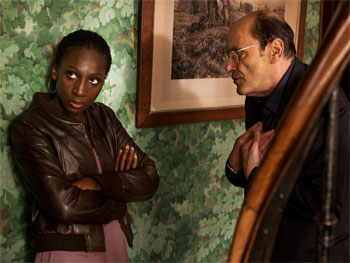 Question: Why did you dream of directing Jean-Pierre Bacri?
Question: Why did you dream of directing Jean-Pierre Bacri? Eric Toledano: Simply because to our minds he is one of the greatest of French actors! We were always impressed by the exactitude of his acting, his sense of rhythm, and his way of delivering a line. With him, everything is always flawless. I remember a scene in which he was on the phone. It was fascinating to see how real it looked. The other actors watched, as if they wanted to learn from him. Besides, we never had as many actors behind the monitor as when Jean-Pierre was playing.
Olivier Nakache: And then if you think about it, Bacri is a synthesis of everything we love about the movies. He is as much at ease and credible in art films as in more lowbrow comedies, such as Didier. He cultivates his rarity, and when he does accept a project, he takes it on fully. He is a person of great integrity and we love the way he operates. With Gérard Depardieu (Let's Be Friends), François Cluzet (Intouchables) and him, we've had the good fortune to direct great actors.
Question: In what way was marriage an inspiring subject?
Eric Toledano: It's an event for which every detail is staged. Much like a play: with an audience, regulatory costumes, and roles to play (witnesses, parents, friends…). The complex organization that it requires inevitably creates stress, tension, mixed emotions, and it is a moment that cannot help but exacerbate family issues. It's a context that everyone is familiar with, and which is always a joy to return to, so it was the ideal background. But our principle was to watch the evening through the prism and point of view of the people who are there to work, for whom it is just one more day. That confrontation and discrepancy will necessarily create comic situations.
Question: One senses a true connection with your second film, Those Happy Days. Had you thought of it while writing it?
Olivier Nakache: The connection came about gradually. Like with Those Happy Days, there is unity of place, a time frame, a staff of group leaders, and participants. And also Jean-Paul Rouve, and a real desire to be funny. In that sense, you might say it's a kind of "Adult Happy Days".
Eric Toledano: Those Happy Days is a flm that crystallised our nostalgia for childhood. Is it because Olivier and I actually met at a summer camp that we often deal with groups in our films? It is in any event what allows us to exist, because cinema is first and foremost a team effort: we meet, we have some great times, we become attached, and then we split up… the better to meet again on other projects.
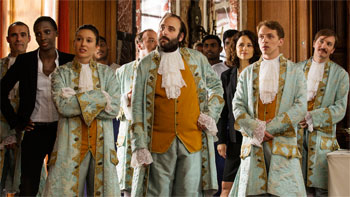 Question: Did you have any film references in mind?
Question: Did you have any film references in mind? Olivier Nakache: Yes several, including Waiter! by Claude Sautet. Generally speaking, Sautet's entire filmography has great meaning for us. That film inspired our movements between kitchen and dining room. It showed us how to move from one universe to another in one shot, and how to depict the relations between waiters who make up the staff at a big Parisian brasserie. And Sautet sets everything up in such a way that the viewer can immediately enter the story.
Eric Toledano: Wild Tales by Damián Szifrón was also a reference, because it was a kind of X-ray of contemporary Argentine society. We were in the middle of writing our movie, when we discovered his film.
Olivier Nakache: And when we saw the last sketch, one of the most brilliant, we realised that our aspirations were the same, because using an evening organised by losers who "adapt", Le sens de la fête becomes a kind of mirror image of France today.
Question: How did Gilles Lellouche become involved in the project?
Eric Toledano: We imagined him from the start as the MC of the evening. Gilles is an actor we particularly like, because he can move so smoothly from one register to the next. For us, he is the perfect embodiment of a rather fragile guy whose dream was to exist in the spotlight, but who ultimately just hosts one wedding after the other. We feel a lot of tenderness and affection for people like that, who sometimes let themselves get carried away with their role, who have a rather approximate hold on reality, and can only take very little distance from themselves.
Olivier Nakache: His character starts out as a cliché. The advantage with that is that we can zoom in on him gradually as the film progresses, fine-tune him and round him out with nuances. Gilles read the screenplay, and immediately agreed to the project and became very receptive. When we asked him to work on the Eros Ramazotti hit, Se bastasse una canzone, or Lovely Day by Bill Withers with a singer who specialises in weddings, he did it very seriously. He really played the game. Like Benjamin Lavernhe too, who after having spent three hours onstage at the Comédie-Française each evening, arrived in the middle of the night to perform a complicated scene, harnessed 30 meters up, under an enormous bubble…
Question: This is the third time you've called on Jean-Paul Rouve to play a role in a movie. What do you like so much about him?
Olivier Nakache: With Jean-Paul, it's very special. He has a special place in our cinema. We started out with him. He introduced us to Gérard Depardieu for our frst flm. He allowed us to exist and progress. And he had the main role in Those Happy Days, a seminal flm for us, which recalls so many strong emotions and remains an indelible memory.
Question: What is so specifc about shooting an ensemble flm?
Eric Toledano: The problem is that when actors enjoy being together, the set can soon degenerate into a schoolyard, and you have to play the cop. The advantage though is the sense of mutual stimulation that circulates on location. What is exciting is to make each character exist, and have him develop to fulfill a function in the story. There is something musical about that: we are orchestra conductors and, depending on how the film evolves, we can suggest that the actors add a little note, or go solo. To compose a work that sounds right, you need to create a genuine relationship with each actor.
Olivier Nakache: Uniting in one and the same film universes as different as those of Vincent Macaigne, Alban Ivanov, Jean-Pierre Bacri, Gilles Lellouche, Suzanne Clément or Jean-Paul is very motivating. And every day we stimulate our actors, so that the score sounds creative and harmonious.
Question: Did you elaborate the choreographies for the wait staff in advance?
Eric Toledano: We did an enormous amount of rehearsals and blockings so that each actor would arrive at the right place at the right time. It took a lot of work for the illusion to work, and for all those movements to look natural. The only question was "does it look credible"? We were obsessed with that, because what we like, when we're members of the audience, is to believe everything immediately.
Olivier Nakache: The risk with telling a story that takes place over one evening in one single place is that it could become too theatrical. To avoid that, we needed to find one single property with decors that were varied enough to offer a lot of possibilities for movement. That way the camera is never static, and its movements bring energy and tension that last all the way until the end of the evening.
Eric Toledano: Our versatile location was inspired by films such as The Rules of the Game or The Party, and is almost a mirror held up to our own professions. Some people had the feeling that we were actually speaking about the cinema in Le sens de la fête, because it mirrors the same kind of ant heap that exists on a movie shoot. In the cinema, there are also a lot of people in the wings who prepare the takes, so that they will be as beautiful as can be onscreen.
Question: Where did you shoot?
Eric Toledano: At the château de Courances, near Fontainebleau. A 16th century structure that belonged to Louis XIII...
Olivier Nakache: …and which has the particularity of having thirteen natural sources on its grounds! The terrain was waterlogged, and we had to adapt. I have to say that the shoot was epic, because it was rainy out, and we often had to dodge raindrops. Just as in the film, like Max and his staff, we had to adapt on a daily basis, and for our own technical crew each dialogue was an echo, or a reminder of our own state of mind.
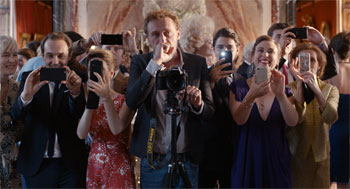 Question: Music plays a key role in this film. How did you approach it?
Question: Music plays a key role in this film. How did you approach it? Olivier Nakache: The jazz of Avishai Cohen accompanied us throughout the entire writing process. Its peculiar tempo and rhythm were an inspiration for us, because it sounds so improvised, but is quite worked out. It was a good fit with the story we wanted to tell. He had never composed any film music before, but since we wanted to reach out to other musical universes, we went to meet him after a concert and asked him to give it a try. He immediately agreed. It was a magnificent surprise, a beautiful encounter.
Eric Toledano: In fact, we always wanted a musician who would take a look at a different artistic genre. And jazz is the musical genre that fascinates us the most, because, like in the movies, everything has to be synchronized to produce an emotion. Avishai Cohen's jazz becomes a true character in the film, a musical synthesis, with percussion, darboukas, double bass, piano, all in atypical rhythm. It perfectly illustrates this evening full of surprises and the unexpected. And that is why we wanted the film to end on a real musical number, in which everyone is represented.
Question: Do you think that "Le sens de la fête", a sense of fun, is at time lacking in French cinema?
Eric Toledano: Many movies, in fact, tell us about how harsh, violent and frightening our world is. This flm was written during chaotic 2015, and it does pointedly ask the question: how do we preserve, in spite of it all, our sense of fun?
C'est La Vie
Release Date: August 8th, 2018
MORE


